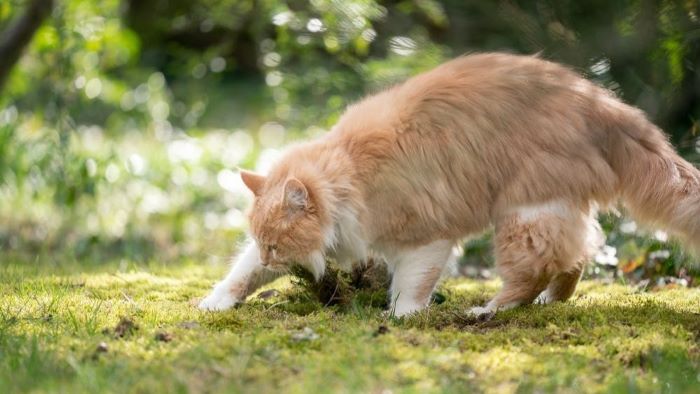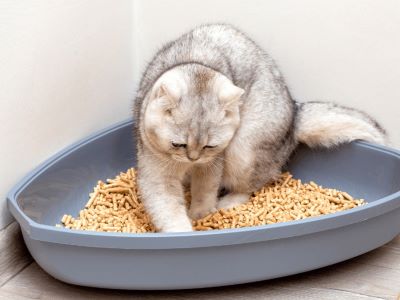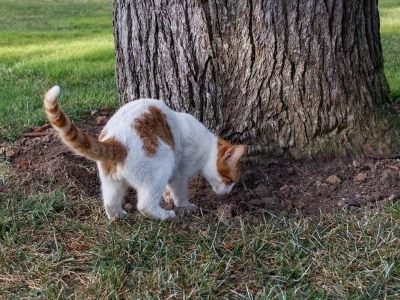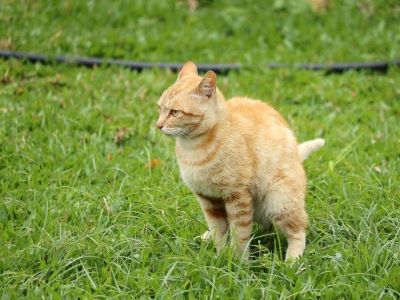If you adore cats, you’re definitely aware of their odd and interesting mannerisms. One of these is their propensity to bury their waste in the ground or in the litter box. Why do they do this, though? Is it an indication of orderliness, power, or something else?
In this blog article, we will look at some possible reasons behind this feline behavior, and what it means for their health and well-being.
Possible Reasons Why Do Cats Bury Their Poop
There can be numerous reasons behind this feline behavior, here are few possible reasons given below:

1] The Evolutionary Origins of Poop Burying
Cats are descended from wild cats that have evolved to fit different environments and lifestyles over thousands of years, including lions, tigers, leopards, and jaguars. However, they still exhibit some ancestors’ instincts and habits, such as how they handle their waste.

To avoid being discovered by predators, cats frequently bury their excrement. Predators in the wild are able to identify certain cats by smelling their waste. In order to hide themselves, cats bury their poop.
Although cats who live in homes don’t have to fear about being hunted, they nevertheless have a strong survival drive to burrow their waste.
Cats bury their waste in order to avoid invading the territory of other cats. Cats in the wild mark their territory with excrement. Other cats can sense the distinct smell of each cat’s poop and interpret it as a signal to “back off.”
Cats will bury their waste, though, in order to prevent conflict because they don’t always want to battle for territory. Even if they don’t live with other cats, domestic cats naturally worry about competing for territory like their wild cousins do.
2] The Social Aspects of Poop Burying
Cats are social animals that develop complex bonds with both humans and other cats. They are not lonely creatures. Burying cat waste is another social activity that promotes harmonious relationships amongst cats.
Pheromones, which serve as scent markers, allow cats to distinguish their own waste from that of other cats.

Cats may have different choices for where and how they bury their poop in a multi-cat home. While some cats might want their own space, others could choose to use the same litter box. While some may barely cover their poop, others may dig deeper pits than others.
These variances could be affected by elements including health, hierarchy, age, gender, and personality.
Generally speaking, humble or less confident cats will carefully bury their waste as compared to dominating or arrogant cats. This is so that submissive cats can hide their existence and avoid conflict with dominant cats.
Instead, dominant cats may leave their waste exposed or even spray pee to mark their territory and show their dominance.
3] The Health Implications of Poop Burying
Cats’ natural tendency to bury their poop is advantageous for both their health and hygiene. Cats lower their danger of transmitting parasites and diseases to themselves or other animals by burying their waste.
Additionally, burying poop lessens its smell and reduces the attraction of flies and other insects that might carry harmful pathogens.

4] The behavioral problems of poop burying
The poop-burying behavior of a cat, though, might occasionally change or indicate a problem. For example:

It could be an indication of stress, worry, or insecurity if a cat starts depositing excrement in unexpected areas, including on the bed or couch, or stops burying it.
The cat might be trying to express discomfort or displeasure with something in its surroundings, such as a new pet, a new person, a change in routine, or a lack of attention.
According to VCA Animal Hospitals, “When frustration, stress, anxiety, or marking are suspected to be the cause, drug therapy and behavior-modification techniques may be effective.”
It may be an indication of a medical condition if a cat has trouble using the litter box or displays pain or discomfort when pooping, such as a urinary tract infection (UTI)[1], kidney problems, diabetes, paw injuries, or arthritis[2] brought due to aging.
An infection, an allergy, an intolerance, or a dietary issue may all be the cause of a cat’s diarrhea or constipation. It’s possible that the cat can’t control its digestive movements or that it struggles to bury its loose or difficult stools.
Solutions
There are numerous cases reported for the same, and it’s quite common in cats. Here are few possible solutions if you notice changes in poop-burying behavior of your cat:

- Consult your veterinarian right away if you observe any variations in your cat’s poop-burying habits or any symptoms of disease.
- Your veterinarian can determine the root of the issue and recommend the proper course of action.
- Along with keeping the litter box cozy and clean, you should also have adequate litter boxes for all the cats you own.
FAQs
What if my cat doesn’t bury its poop?
It may be a sign of stress or a health problem if your cat suddenly stops burying its waste or never does. A veterinarian should be consulted to rule out any underlying medical issues.
Can I train my cat to bury its waste?
Although most cats know instinctively to bury their waste, certain kittens or rescued cats might not have picked up this habit. In these situations, you might gently replicate the act of burying the litter by pawing at it; the cat may imitate the movement.
Should I clean the litter box immediately after my cat uses it?
Although it’s a good idea to clean the litter box frequently, doing it right away after each use may not be necessary. The majority of cats won’t care if the box isn’t cleaned immediately away, but routine upkeep is necessary to avoid stink and guarantee your cat’s comfort.
Why do cats bury their poop?
Cats naturally bury their waste as a defense measure. In the wild, placing excrement outside can entice predators or warn off possible food. They can stay undetected and keep a low profile by burying their excrement.
Conclusion
Cats’ natural and accepted practice of burying their waste has evolutionary as well as social roots. Cats bury their waste to avoid invading the territory of other cats and to conceal their whereabouts from predators. Cats may keep up their health and hygiene by burying their waste.
But not all cats bury their waste permanently or consistently. Based on their personalities, age, gender, health, and social status, some cats may bury their waste more or less than others. Stress, worry, uncertainty, or illness can also cause some cats to stop burying their poop or to start dropping it in unexpected locations.
The best care for your feline friend can be given if you are aware of why cats bury their waste. Observe any changes in their behavior, provide a tidy environment for the litter box, and speak with your veterinarian if you have any worries. You’ll be able to give your cherished cat a long and happy life by doing this.
Reference:
- Mmyers. (2023, February 16). Understanding and Resolving Lower UTIs In Cats and Dogs. VMBS News.
- Peake, T. (n.d.). Does your cat have arthritis? NC State News.

Brenda Castillo is a volunteer groomer of a local pet welfare group in New York and a regular contributor to CatLikesBest. She likes to read & write about cat grooming. She also guardians two chubby tabbies, Belly & Puma.

